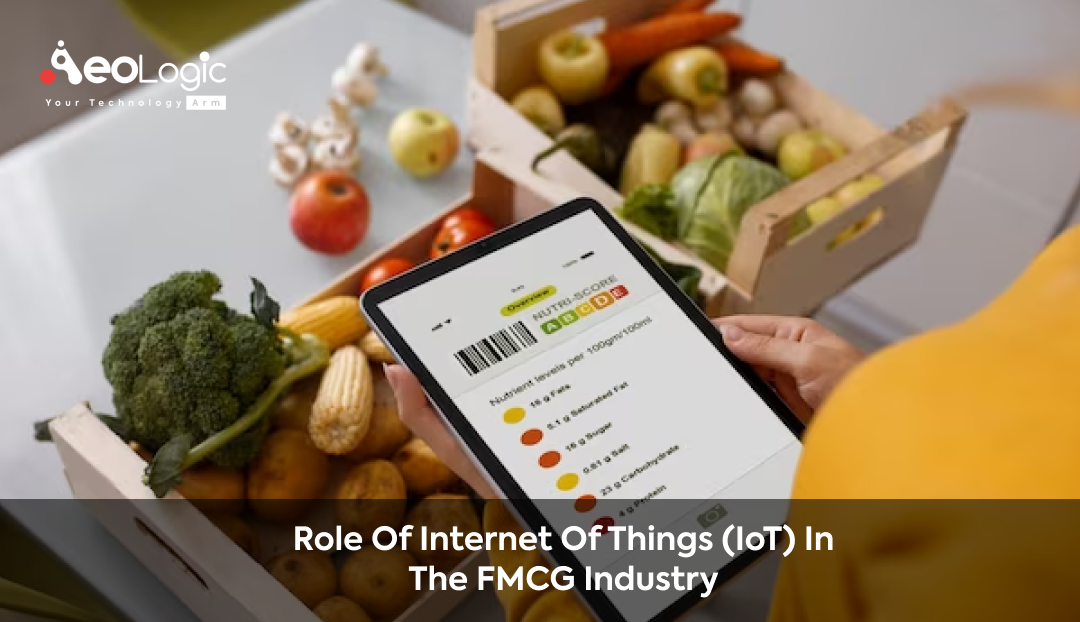Spanning everything from sensors and automation to cloud computing and data analysis, the Internet of Things (IoT) is a network of connected devices, systems, and services. Across the FMCG sector, IoT has applications in supply chain optimization; product monitoring, customer engagement, and manufacturing efficiency; and even at the retail level. Technologies such as RFID tags, smart sensors, and connected devices are today playing a leading role. The use of Internet of Things in FMCG industry is increasing productivity, giving out better consumer insights, and improving operational strategy.
The Features of IoT Technology in FMCG
The following is a list of the most significant features of Internet of Things technology that contribute to the enhancement of the production quality of enterprises.
1) Real-time Monitoring
In order to extract pertinent information from the assets, Internet of Things technology makes use of sensor capabilities. A variety of distinct verticals of many products are included in the fast-moving consumer goods (FMCG) industry. In this sector, sensor-based technology efficiently offers managers with real-time insights. At the same time that they improve the quality of production, they make it possible for fast decisions to be made in the FMCG industry.
Boost your business with our IoT Solutions
2. Fleet Management
Whether it is getting delayed, on time, or its real-time status, the majority of firms experience difficulties when it comes to providing an accurate estimate of the time at which the product will be delivered. In this context, Internet of Things (IoT)-powered fleet management comes into play with expanded possibilities of real-time monitoring, a data-driven approach, systematically involved supply chain processing, and interconnected smart devices. In order to monitor and keep a big pool of networks in good condition across all key enterprises, it is necessary to implement an intelligent fleet management strategy.
Additionally, it is one of the most advanced ways in which organisations are able to adopt the technological revolution and receive benefits such as supply chain transparency, which in turn leads to improved commercial chances.
3. Detailed Insights
An eye for detail is something that almost every industry is looking for, and they anticipate a solution that will provide specific insights on how to improve efficiency. The Internet of Things (IoT) technology plays a significant role in this context by providing a wide range of solutions for organisations. These solutions include sensor-based architecture and powerful algorithms for analytics. This provides the industrialists with the ability to acquire precise insights on the behaviour of consumers and their purchasing patterns, which has a direct impact on the strategic product sales for the fast-moving consumer goods (FMCG) industry. In order to increase their job skills, managers can easily improve their work abilities by acquiring important industrial insights and making successful decisions.
4. Advanced Analytics
Integrated with the Internet of Things technology is a system that provides assistance in assessing the current state of the process in real time. The industrialists are able to have clear view of the factory floor, which allows for seamless operating, thanks to the assistance of powerful digital analytics. In addition, analytics covers the distribution sector in a significant way, which makes the process of optimising the networks much simpler and more expedient.
As a consequence, this leads to increased efficiency and serves purpose in accordance with the ever-changing behaviour of consumers. Numerous businesspeople operating in the fast-moving consumer goods (FMCG) sector are capitalising on the advantages of implementing intelligent solutions and reworking the marketing and operations sector in order to achieve lucrative outcomes.
Also Read: The Importance of Information Technology in Healthcare
5 Smart Inventory Management
When it comes to fast-moving consumer goods (FMCG) companies, one of the most important areas that requires frequent oversight and real-time monitoring is inventory management. When it comes to smart inventory management, solutions that are based on the Internet of Things remove errors and build up high possibilities for keeping the products organised in a systematic manner. When the sensors are deployed, they are able to extract data about assets such as their position, condition, and other pertinent specifications. This provides the managers with the necessary industrial information for improved output.
Let’s take a look at how the Internet of Things is changing the FMCG landscape and paving the path for a future of seamless operations and unrivalled efficiency.
Enhancing Supply Chain Management
GPS tracking, RFID tagging and sensor-based logistics are all important technologies in supply chain management. They provide real-time information on transportation, warehousing and inventory. This digital transformation means better visibility, smoother transition processes and improved distribution networks. Taking advantage of data analytics, IoT in FMCG industry optimizes logistics, reduces waste, and improves the adaptability of supply chains.
- Real-time Tracking: Real-time tracking of goods is made possible by IoT. Sensors attached to products or vehicles send real-time data, and companies are able to track the exact location of their items.
- Inventory Management: With the help of IoT, automated inventory systems can monitor stock levels. The likelihood of overstocking or a lack of stock is reduced to practically zero.
- Predictive Maintenance: IoT devices enable machinery to be preemptively maintained so that unexpected breakages can’t occur, which could disrupt the supply chain.
Read our trending blog: Top IoT Security Challenges and Solutions
Improving Product Quality and Safety
FMCG technology is the key to product quality and safety. From production to delivery, sensors and smart devices monitor conditions all the way through the product lifecycle. Such monitoring allows for compliance with health and safety standards, maintains freshness in perishable goods and permits preemptive quality control. IoT-enabled insight aids speedy decision making, so that products can live up to consumers ‘high expectations.
- Temperature Control: Sensors for the Internet of Things monitor temperature and humidity in storage and transportation of products like food and pharmaceuticals. They allow these products to maintain their quality.
- Quality Control: Automated systems enabled by IoT can detect product deficiencies quicker and with greater accuracy than human inspections. Only fine products reach the hands of consumers.
- Safety Compliance: IoT can monitor and help enforce safety standards, reducing the expected rate of product recalls.
Also Read: How IoT Technologies benefits Agriculture all over World
Enhancing Customer Engagement
As for customer engagement, the IoT has brought together physical products and digital experiences. With such innovations as smart labels, online packaging and interactive advertising, consumers ‘relationship with FMCG products is changing. They obtain valuable consumer information, upon which they can base individualized marketing and build brand loyalty. The Internet of Things in FMCG isn’t just about technology, it’s a question of making the consumer experience more engaging and responsive, customized to each individual.
Personalized Marketing: With data on consumers’ preferences collected by the IoT, companies can fine-tune their marketing efforts. Customer Feedback: By interacting with consumers ‘smartphones, a variety of customer information and feedback can easily be submitted. Innovative Products: The Internet of Things in FMCG industry has led to the development of innovative products, like smart packaging that enhances user experience.
Optimizing Manufacturing Processes
The use of IoT in manufacturing processes, with automation and real-time monitoring, as well as predictive maintenance, has all resulted in significant improvements to efficiency. With the combination of IoT sensors and machines, FMCG companies can improve production lines, reduce downtime and ensure product quality. Such smart manufacturing solutions allow for much better resource management, lower costs and higher safety standards, all key components of maintaining competitiveness in the FMCG sector.
- Efficiency Improvement: IoT devices can help optimize the manufacturing process, making it more effective and eliminating waste.
- Energy Management: Smart sensors in manufacturing facilities monitor energy use and can be used to manage costs and environmental impact.
- Worker Safety: IoT devices that monitor conditions and warn of danger can improve worker safety.
Boosting Retail and Distribution
In the field of retail and distribution operations of FMCG, IoT allows for innovations like smart shelves, automatic inventory control, better communications with customers. These technologies change the way people shop, creating something that’s more convenient and engaging. Data from IoT devices give retailers greater insight into consumer behavior, allowing them to stock items more efficiently and accurately forecast trends. The Internet of Things in FMCG industry is reshaping the retail landscape, making it more data-driven and customer-centric.
- Smart Shelving: With the help of IoT, electronic shelves will monitor stock levels and alert retailers when it is time to replenish.
- Demand Forecasting: Analyzing data from IoT devices can help forecast product demand, and adjust inventory levels.
- Enhanced Shopping Experience: Such IoT technologies as smart carts and an automated checkout can make shopping much easier by speeding up the process.
Also Read: IoT Asset Tracking Benefits for Hospitals in 2023
Challenges and Solutions of Internet of Things in FMCG Industry
Of course, meeting the challenges of adopting IoT in FMCG industry remains a difficult task. Those who can navigate the quagmire will gain an advantage over their competitors. But these difficulties can be overcome with wise planning, investment in cybersecurity and an eye to the future. FMCG companies cannot afford to ignore the opportunity represented by IoT.
- Data Security: This collection of data through IoT is the biggest security challenge. Strong cyber security is of the essence.
- Integration with Existing Systems: Integrating IoT with existing systems can be difficult. Firms should invest in appropriate technologies and personnel training.
- Cost Considerations: Investing in the IoT can be quite expensive at first. But these costs are more than offset in the long term.
Also Read: Benefits of IoT Solutions in the Manufacturing Industry
Final Words
The Internet of Things in FMCG industry is changing the way companies do business, relate to consumers and manage their supply chains. And embracing the IoT allows FMCG companies to be more efficient, stimulate innovation and improve customer experience. As technology continues to change, IoT will only serve a bigger role in the FMCG world. It presents new opportunities and challenges. But this is not just a fad. This digital transformation is the future of FMCG.
To explore how IoT can revolutionize your FMCG business, connect with Aeologic Technologies. Our expertise in cutting-edge technology will guide you towards innovative, tailored IoT solutions.










